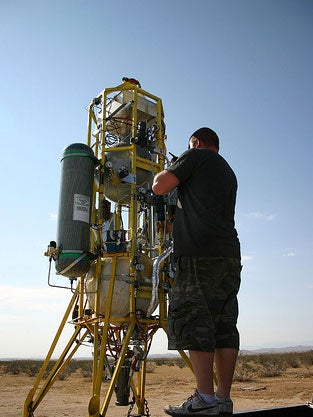Your support helps us to tell the story
From reproductive rights to climate change to Big Tech, The Independent is on the ground when the story is developing. Whether it's investigating the financials of Elon Musk's pro-Trump PAC or producing our latest documentary, 'The A Word', which shines a light on the American women fighting for reproductive rights, we know how important it is to parse out the facts from the messaging.
At such a critical moment in US history, we need reporters on the ground. Your donation allows us to keep sending journalists to speak to both sides of the story.
The Independent is trusted by Americans across the entire political spectrum. And unlike many other quality news outlets, we choose not to lock Americans out of our reporting and analysis with paywalls. We believe quality journalism should be available to everyone, paid for by those who can afford it.
Your support makes all the difference.A team of California rocketeers has won a $1 million (£604,000) prize in a simulated lunar landing contest backed by Nasa.
The X Prize Foundation said that Mojave, California-based Masten Space Systems had a better landing accuracy than was achieved by Armadillo Aerospace of Rockwall, Texas, which got $500,000 (£302,000) for second place.
The teams flew robotic rockets that had to rise more than 160 feet (49 metres), stay aloft for at least 180 seconds while travelling to a rocky landing pad, and then fly back to the starting point.
The flight profile simulates what would be required to descend from lunar orbit, land on the moon and then lift off again to return to lunar orbit.
Nasa put up $2 million (£1.2 million) in prizes for the Northrop Grumman Lunar Lander Challenge as an incentive to spur development of technology by space entrepreneurs.
In a less-demanding lower level of the competition, Armadillo was first and won $350,000 (£211, 692) while Masten got $150,000 (£90,740) for second place.
A father-son team called Unreasonable Rocket had unreasonable luck with two rockets during the weekend in Cantil, California. One rocket dubbed Blue Ball ran out of fuel in the lower level challenge. Its second rocket, Silver Ball, which was intended for the top level, was wrecked in a test while tethered to a crane.
Andrew Petro, Nasa's Centennial Challenge program manager at Nasa headquarters in Washington, D.C., said in a press release that the contest had the intended effect.
"These companies have demonstrated reusable vehicles with rapid turnaround and a surprising degree of precision in flight, and they have done all this at a much lower cost than many thought possible," he said.
Nasa will present $1.65 million (£998,000) in prizes on Thursday. Armadillo's first-place award in the lower level competition was presented last year.
The X Prize Foundation managed the contest while Northrop Grumman provided support.

Join our commenting forum
Join thought-provoking conversations, follow other Independent readers and see their replies
Comments